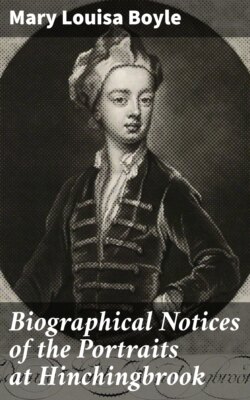Читать книгу Biographical Notices of the Portraits at Hinchingbrook - Mary Louisa Boyle - Страница 7
На сайте Литреса книга снята с продажи.
John Wilmot, Earl of Rochester:
ОглавлениеTable of Contents
By WISSING.
Three-quarter Length.
(In Armour, holding a Truncheon.)
Born, 1648. Died, 1680.—Son of the second Earl, by Anne, daughter of Sir John St. John Bart., and widow of Sir Harry Lee, of Ditchley. The father, a staunch Royalist, died before the Restoration, and left his son little inheritance beyond his title; but that little was well and carefully managed by the widowed mother. Rochester distinguished himself at school, and also at the University, and although he fell into bad habits in early life, he always retained a love of learning which was most beneficial to him in his latter days. He travelled under the care of a learned Scotchman, Dr. Balfour, whose name he never mentioned without affection. He distinguished himself in several naval engagements under the brave Earl of Sandwich and other commanders, and married Elizabeth, daughter of John Mallet, Esq., “the beautiful heiress,” who, after supping with Mistress Stewart, was quietly returning to her lodgings when she was seized upon at Charing Cross by some emissaries of my Lord of Rochester. The lady did not incline to his suit, although it would appear the King himself had spoken to her in behalf of his favourite. But this violence so incensed his Majesty, that he ordered my Lord Rochester to the Tower, and there seemed every chance of his being supplanted by his numerous rivals. Pepys does not tell us how the adventurous lover at length prevailed on the lady to accept his hand, but he enumerates “Mistress Mallet’s servants:” “My Lord Herbert,” [afterwards 6th Earl of Pembroke,] “who would have had her, my Lord Hinchingbrook, who was indifferent to her, my Lord John Butler [son of the Duke of Ormond] who might not have her, Sir ... Popham who would do anything to have her, and my Lord Rochester, who would have run away with her.” Verily, she made a bad choice among so many.
Lord Rochester was remarkable for his wit, but also for the extreme licentiousness of his manners and writings. He was a great satirist and had many readers in an age when grossness of style was not only tolerated but admired. His Poem on “Nothing,” and the satire against Man, showed great ability, lavished on a bad cause. Of an elegant person, easy address, and winning manners, he was, indeed, a dangerous companion, and his profligacy was notorious, even in the reign of Charles II. He was a great favourite with his royal master, who delighted in his sallies, and declared he preferred Rochester’s company, even when he was drunk, to that of any other man, when sober. In his pursuits after adventures he would assume all sorts of disguises, sometimes that of a beggar, or porter, or even a quack doctor; and he well knew how to sustain every kind of character. Horace Walpole says of him, “the Muses loved to inspire him, but were ashamed to avow him.” De Grammont said he had more wit, and less honour than any man in England.
But it was reserved for Bishop Burnet, in whose society and conversation he fortunately took great delight, to effect a radical change in the opinions of a man whom the Divine himself had always declared born for better things. By gentle forbearance, considerate kindness, and honest candid friendship, Dr. Burnet brought the suffering and unhappy man, to a sense of the error of his ways, and the letter the Bishop received from the penitent shortly before the death of the latter, is most conclusive on this head:
“Woodstock Park, June 25, 1680.
“My most honoured Dr. Burnet,
“My spirits and body cling so equally together, that I shall write you a letter as weak as I am in person. I begin to value Churchmen above all men in the world. If God be yet pleased to spare me longer in this world, I hope in your conversation to be exalted to that degree of piety, that the world may see how much I abhor what I so long loved, and how much I glory in repentance, and in God’s service. Bestow your prayers upon me that God would spare me (if it be His good will) to show a true repentance and amendment of life for the time to come, or else, if the Lord please to put an end to my worldly being now, that He would mercifully accept of my death-bed repentance, and perform His promise that He has been pleased to make, that at what time soever a sinner doth repent, He would receive him. Put up these prayers then, dear Doctor, to Almighty God, for your most obedient, and languishing servant,
Rochester.”
During his last, and most painful illness, he listened with meek deference to the exhortations of many godly men, and received the Sacrament with his Lady, which he told Dr. Burnet gave him the more satisfaction, as for a time she had been misled by the errors of the Church of Rome.
Towards the wife who had so much cause of complaint against him he expressed the sincerest affection and contrition, so much so as to call forth the most passionate grief on her side. He took leave of all, sent messages to many of his thoughtless comrades, hoping that as his life had done much hurt, so by the mercy of God his death might do some good; called often for his children, his young son, and three daughters, thanked God in their presence for the blessing they were to him; and died quietly, and peacefully at the last, after suffering terrible anguish of body, on the morning of the 26th of July, 1680, at the Ranger’s Lodge at Woodstock.
